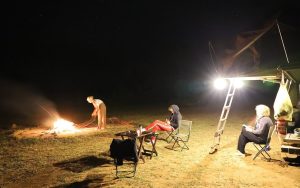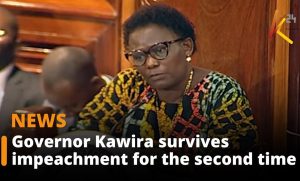A mighty fire breaks out in a Nairobi slum on a chilly Monday morning. People are burning down to ashes and bones. Their meagre possessions are up in flames. There is utter helplessness. Rescue operations get underway but the death toll is rising. TV stations alternate between live transmission of the disaster and airing entertainment programmes: music, soaps and movies…
That evening during the seven o’clock news bulletin, a Citizen TV reporter wonders quite patronizingly why Kenyans have failed to learn from previous catastrophes and continue to mindlessly engage in behaviour that exposes them to death and injury.
The conclusion the media – not just Citizen TV – seems to have drawn is that the poor are to blame for the misfortunes that befall them. Practically all the news reports took this view – except a news feature in the Daily Nation by Murithi Mutiga. Nation Special Projects Editor and columnist Macharia Gaitho best captured this thinking.
In a column titled, ‘Don’t blame government for slum inferno, lay it at door of impunity’, Gaitho argued that, not only did the residents of Sinai start the tragedy by trying to steal leaking oil, but they have also for years resisted government efforts to relocate them. He did not say to where.
Here are Mr. Gaitho’s exact words: ‘Today, let us not blame the government. Let us not point the finger at the ruling classes. In the wake of the Sinai disaster, we must examine our own sense of entitlement, impunity and greed. Nothing else can explain why adults of sound mind would rush headlong into a race for spilt petrol in total disregard of the obvious dangers. Nothing else can explain why people in their right senses would insist on living atop an oil pipeline.’
The very next day, Karanja Njoroge who writes the ‘Point Blank’ page in the Standard blamed the Sinai tragedy on negligence on the part of Kenya Pipeline Company and greed. “We are a greedy lot, and most likely won’t learn from this disaster where some died clutching gallons of petrol.”
And in an editorial on Thursday about the fire tragedy and the death of over 20 people from poisonous moonshine, Nation suggested that Kenyans (read the poor) are suicidal and that there is nothing anyone can do about it. “Sometimes, one can be forgiven for throwing up one’s hands in despair because it appears Kenyans have a collective death wish.”
Well, is it really greed, impunity and a death wish that account for these tragedies among the country’s poor people? But before that, let’s state here that it is simply not true that all those people – men, women and children – who perished or suffered serious injuries at Sinai were actually in the “race for spilt petrol in total disregard of the obvious dangers”, as Mr. Gaitho wrote. It is so callous to generalize.
There surely must be people lying in hospital beds or in the morgue who had no idea how the fire started or who weren’t “clutching gallons of petrol”, an unquestionable sign of greed according to Mr. Njoroge of The Standard. Yet Gaitho and Njoroge – and the media generally – have no problem characterizing all poor people as a mass of greedy dimwits.
And this is the real point that the media has missed when covering such disasters: we live in a country where some people are so poor they would not hesitate to engage in extremely risky actions out of desperation to get something for themselves and their families.
What the media is often quick to condemn as Kenyans’ “greed”, “impunity”, “love for free things” or “a collective death wish” is actually the consequence of grinding poverty arising from years of looting and mismanagement of national resources. There is also the failure of the state to protect the people by securing certain potentially dangerous areas. Why haven’t we seen slums built inside military barracks or at State House?
The slum dwellers are mostly school leavers or drop-outs clinging by the skin of their teeth on the walls of Kenya’s woefully unjust socio-economic train. Their parents were not rich enough to take them to the best schools and colleges or to give them anything meaningful with which to start adult life.
You have heard public officials calling for ‘civic education’ to discourage Kenyans from trying to collect spilt oil at accident scenes. You have heard sermons against the consumption of deadly brews as well.
But The Bulletin guarantees that no amount of ‘civic education’ or preaching is going to stop poor people from living dangerously. If the oil leak in Sinai happens in an area occupied by well-off people, the chances of a fire killing 100 people are almost nil. Death from poisonous alcoholic brews always happens in the slums or in some rural village.
Why is it that only poor people die in this manner? Are they simply suicidal, ignorant or greedy?
Unlike what Mr. Gaitho said – and the rest of the media implied – the government is fully to blame for the Sinai disaster and all the others. Why are some people in this country so poor that they have to take serious risks to stay alive while others live in excess comfort?
Are the millions of people living dangerously in the slums of Nairobi entitled to basic services in the city? It is claimed that the people of Sinai rejected attempts by the government to move them. Did the government really have a plan to move them, or it only wanted to evict them?
On what grounds could anyone argue that people who don’t have big money should not live in the city? How did the slums come about in the first place? How can we say that ‘Kenya belongs to all Kenyans’ when wide socio-economic inequalities have made it impossible for millions of citizens to live decently in their own capital city?
And now, what comprehensive plans does the government have for the poor people living in slums, beyond the sickening promises to foot the costs of burial and medical care for those burned in Sinai? What was the point of declaring two days of national mourning? Who actually mourned?
These are the urgent questions the media needed to ask – and this country needs to address. It is extremely heartless to blame the poor for their own suffering. And as has been experienced elsewhere, poor people are not going to put up with their dehumanizing conditions forever. Their plight is not only a question of justice but also a potential source of social instability. The poor exist because of the rich.
The blood of the Sinai people should not dry in the dust in vain. The government (which never lacks money to meet all sorts of needs of the privileged class) must move beyond talking, beyond dreams like Vision 2030, and make poverty alleviation its top priority.
It was buried deep inside The Standard newspaper last Monday, on Page 33 after the sleazy ‘Crazy Monday’ pullout and business news. ‘Aga Khan carries out first video surgery’, read the headline.
“Kenya is firmly in the fast lane towards comprehensive e-health provision,” the paper jubilated. “Last week, surgeons from Aga Khan University Hospital performed the first ever surgery using the video conferencing surgery technology…”
This could well be the year’s biggest science story. But it hardly received much media attention beyond the report in The Standard. It couldn’t beat politics.
The only reason why the science story was not splashed on the front page is because of the apparent thinking at The Standard – and in all media houses – that Kenyan news consumers are more interested in politics than in science and technology or anything else.
A scientific innovation that would touch the lives of hundreds of thousands of people is of much less interest than a political rally meant to push the agenda of a handful of politicians. Is that indeed what Kenyans want?
Ok, there is nothing wrong about public interest in politics. In fact every effort should be made to encourage this. Politics concerns the exercise of power to organize public affairs. We should all be interested in how that is done. But is that the type of media coverage of politics we see?
Hardly. It is mostly about personalities: what politician A said, who is making alliances with whom, etc. It is about who is going up and who is coming down.
The media, as we all know, has agenda-setting as one of its many functions. It may not be very good at telling people what to think, but it is quite powerful in telling people what to think about. So, there is a sense in which Kenyans’ alleged obsession with petty politics is a creation of the media. If media opted to shift focus, it can be reasonably expected that in time the public will follow suit.
Is that about to happen? We can only hope. Important developments like the use of video conferencing surgery are opportunities to relegate politics to the back burner and signal to the public that there is more to the news than what’s going on in the minds of William Ruto, Uhuru Kenyatta, Raila Odinga, etc.
That may require more creative and bolder heads at decision making levels in our media houses; people who are willing to use the powerful means at their disposal to help the nation dream of possibilities beyond the power games of the political class.
A while back, NTV launched a daily business news programme called PM Live. A great initiative when one considers that, as we have already stated, the important news in the Kenyan media tends to be about politicians. K24 and KBC Channel 1 also have new business programmes. That’s great.
The only problem, though, is that the programmes basically focus on what the corporate honchos and state mandarins are doing around town. Of course one or two stories about start-ups are thrown in from time to time.
But the general impression one gets is that doing business is an elite domain for the very lucky few who were chosen by God before the foundations of the universe were laid. The rest of us should watch from the sidelines and take notes if interested; otherwise we should continue our wretched existence watching political theatrics as a form of entertainment.
The business news programmes never really dig up stuff about those big firms. They are all great enterprises conducting every transaction above board and enriching the nation; they are great corporate citizens who meet all their obligations under the law and have great records in corporate social responsibility, and so on.
We refuse to believe this narrative. We are more inclined to buy the argument that most of the stories are PR stuff meant to attract advertising from the big spenders.
That is why it is nearly impossible to find a critical story about the corporate giants- until the trade union calls a strike. We know media organizations are themselves businesses and that some of the owners or directors sit on the boards of the same companies their journalists should investigate. The challenge here is for the media to make up its mind about its primary role of speaking the truth to power – including corporate power.
Something else: there is an entire area of big business that is largely ignored. Whereas the main focus of business news is how well the big firms are doing, the Larry Madowos, Liz Ntonjiras, James Karanis, Wallace Kantais and Steve Kimanis of TV business news in this town aren’t telling us who gets those huge government contracts and how. There are interesting shenanigans going on in that area.
One striking example: The East African news magazine last week carried a story about how the geothermal sector in Kenya has become the new battlefield where Western and Chinese companies are scrambling for contracts. Already a Chinese contractor has signed a secret deal with the government to drill 80 geothermal wells, the paper reported.
What’s interesting about the deal, according to The EastAfrican, is that the contract was not awarded after competitive bidding. Moreover, the state-owned Geothermal Development Company is capable of drilling the wells at a cost far less than what the Chinese will take. No doubt there is a funny smell about that deal.
When are we going to see these kinds of investigations on TV business programmes? Are certain powerful politicians cutting deals with big firms to raise campaign money for 2012 elections? Right now, Kenyans are buying sugar at extremely high prices. What exactly is behind this crisis?
TV business news people may be seated in their glitzy studios lulling us to sleep with tales of how good or bad business is in town while powerful people are colluding with local and foreign corporations to rob us.
You owe this country a lot more, folks.
On Sunday 11 September 2011 and the following day, the media carried many reports about the tenth anniversary of the terrorist attacks in the US. Nearly 3,000 people from many nations, including Kenya, died in the bombings by Osama bin Laden’s al-Qaeda network.
As reported, the attack changed the world in many ways. But what was missing from the analyses is the fact that the global war on terror (GWOT) launched by America and its allies in the aftermath of the tragedy has caused plenty of suffering for millions of innocent people around the world: in Iraq and Afghanistan, for example.
Under the pretext of GWOT, America and its allies continue to pursue their imperialist agendas in Africa, going after oil and other resources.
Equally disturbing is the fact that over the past decade, the GWOT has had nothing to say about the injustices and inequalities in many parts of the world which feed radicalism and violence.
In carrying the reports (many of them produced in the West), our media appeared to back the mistaken Western notion that the GWOT can give the world peace. It is a lie. Violence only begets violence.
And by the way, are all human lives equal? If so, why did the media give such scant coverage to the ferry tragedy in Zanzibar, when acres of space were dedicated to a memorial recount of 9/11? Tanzania is a sister-state in the East African Community.
While can afford to devote time and space to the 9/11 anniversary, when was the last time anyone saw such coverage of the annual commemorations of the Rwanda genocide in which about one million, yes a million, people were killed in 1994?
Rwanda, in case media houses did not know, is a sister-state in the EAC. Or is what happens in the US more important to us than events in our own region?
All The Bulletin is asking is this: Whose global agenda does out journalism serve?
And finally, a senior journalist at The Standard recently spoke candidly about how media owners in Kenya meddle with editorial content to suit certain interests. It is something many news consumers are not aware of. Kenyan media is generally thought of as fiercely independent of vested political and other interests, hence the immense public approval ratings in opinion polls.
The Standard man attempted to trace the decline of his paper to 1997 during the election campaign when the paper led with the headline, ‘Why you should vote for me’, or something to that effect. Under that banner was a huge picture of the owner of the media house, who the journalist did not think he needed to name.
With that single editorial decision, no doubt pushed from above, The Standard had blatantly reduced itself to a partisan rag at a time when the public was decidedly tired of then President Daniel arap Moi.
Of course Moi went on to win the election, thanks to the divided opposition and the smart manouvres of ‘the professor of politics’. But, in the opinion of The Standard journalist, his paper lost credibility in the eyes of the public and has never fully recovered.
Today, Moi still regularly makes the news in the Standard Group’s outlets while other media houses generally do not bother with the former president’s preachments. Sometimes Moi doesn’t say or do anything really newsworthy, but he gets space and/or airtime in the paper and on KTN news. Now, we cant begrudge the editors their decision making right. But take, for example, his meeting last Wednesday with Mheshimiwa Chief Justice Willy Mutunga at Kabarnet Gardens in Nairobi. KTN carried the ‘story’, which was just pictures of Moi shaking hands with Mutunga as his ever unsmiling hangers-on – John Lokorio, Lee Njiru, etc – looked on.
As a public service, The Bulletin would like to direct Moi’s admirers and all those who miss him and want to ‘fuata nyayo’ to always buy a copy of The Standard and watch KTN news. You will catch him there busy ‘building the nation’ he sat on for 24 years.




